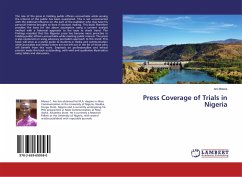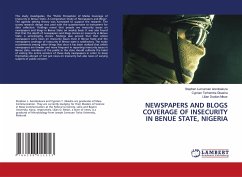The role of the press in holding public officers accountable while serving the interest of the public has been questioned. This is not unconnected with the editorial influence on the part of the publisher who may have his personal interest brought to bare in decision making. This book therefore provides the basis for the above assumption using a content analysis method with a historical approach to the issue to check trend. The findings revealed that the Nigerian press has become more proactive in holding public officers accountable while meeting public interest. The press is also cautioned on using advocacy journalism approach to this trend. This book will serve as a useful guide to students in media and communication while journalists and media writers are not left out in the list of those who will benefit from this work. Emphasis on professionalism and ethical practice made this book outstanding, with vivid and qualitative illustrations using tables and discussions.
Bitte wählen Sie Ihr Anliegen aus.
Rechnungen
Retourenschein anfordern
Bestellstatus
Storno








